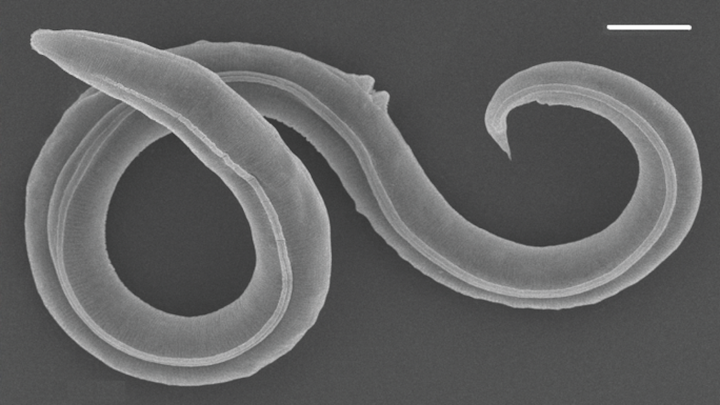According to The Washington Post and Live Science , the creature brought back from Siberia by scientists is a nematode belonging to the roundworm phylum.
It belonged to a previously undiscovered and extinct species, named Panagrolaimus kolymaensis.
GeneticsBringing this Panagrolaimus kolymaensis from a 46,000-year-old frozen patch of land, an international team of scientists were amazed when it revived healthily after thawing.
It was a female so it started giving birth as soon as it came back to life.
This is a new record for nematodes resurrected after tens of thousands of years of being frozen. The previous two record-holders, brought back from Antarctica and the Arctic, were 25,500 and 39,000 years old, respectively.

Tiny "monster" revived from Siberian permafrost - Russia. (Photo: PLOS)
GeneticsAccording to Dr. Philipp Schiffer, head of the research team from the Institute of Zoology - University of Cologne (Germany), in addition to the "time travel" factor, this extinct creature is also interesting because of the way it paused all life activities to be able to survive for so long in a frozen state.
To find out, the scientists tried drying several individuals of this new species and another nematode species, Caenorhabditis elegans.
When these tiny organisms switch to a hydrophobic state, they produce a sugar called trehalose, which helps keep their cell membranes from becoming dehydrated.
Continuing to freeze them at minus 80 degrees Celsius, scientists confirmed that this mechanism helped the creatures survive because they did not lose water, ready to revive at any time when conditions were suitable.
Siberian "zombie" revives after 50,000 years of freezing: Chilling warningShocked with "monster" revived after being eaten, calmly mating, giving birth10,000-year-old Tibetan creature is about to "revive", could it cause a new pandemic?
This study, recently published in the journal PLOS Genetics, also included contributions from scientists from the RAS Institute of Zoology - Moscow State University (Russia), the Max Plack Institute for Genetics and Cell Biology, the Institute of Systems Biology (Germany), ETH Zurich (Switzerland), the University of Dublin (Ireland)...
The discovery, while exciting, also adds to a recent concern: Climate change is melting permafrost regions like those in Siberia, which could release ancient disease-causing viruses and bacteria.
If they survive, these "dormant" microorganisms could potentially revive a catastrophic pandemic.
(Source: Nguoi Lao Dong/The Washington Post)
Useful
Emotion
Creative
Unique
Wrath
Source




































































































Comment (0)